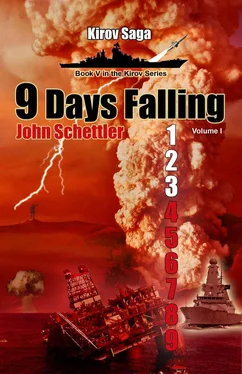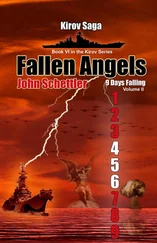“Könnte es ein Vulkan sein?” said one of the men by the door.
“In Sibirien? Ein Vulkan?”
“Haben Sie auf dem Auto überprüft? Wenn Protos beschädigt wurde dann könnten wir einen weiteren tag mit reparaturen zu verlieren.”
The other three men who had been following the proprietor were speaking in another language, which he now recognized as German. One wore a close fitting bonnet that covered his head and ears, leaving only his beady black eyes above a ruddy cheeked face, with long thin handlebar mustache. The other two had eye goggles strapped above the bills of woolen caps, and double breasted overcoats with brass buttons.
Fedorov knew a little German. The men had said something about a volcano and now they were talking about having to repair a car. His bewilderment redoubled, and then he looked at the wall behind the front desk counter where the portrait should have been—the portrait now huffing about behind the counter in flesh and blood, and he saw something that stunned him. The calendar there read June, 1908!
He stepped back, a startled expression on his face, and the old gray haired man behind the counter finally noticed him, giving him a strange look as though he was trying to place the man. Fedorov backed away from the scene, his mind a dizzy whirlwind of confusion. He suddenly remembered the microphone in the collar of his service jacket and, as he backed into the dining hall again by the hearth he pinched the toggle and spoke quietly, desperately.
“Troyak? Zykov? Can you read me?”
Silence.
Fedorov gave the back staircase a wide eyed look. He had been warned about those stairs by Ilyana, but now his only thought was to get back up to the second floor and into his room. He wanted to see if his hat and overcoat and equipment were still there—if his sanity could be found among those effects—and he slowly backed into the shadow of the stairwell, eyes wide with amazement. He saw the young man, Mironov, staring at him from across the room, a look of suspicion on his face now. Then there came another distant rumble of what sounded like thunder.
Fedorov turned and quickly began to climb the stairs. It was just a short flight of twelve steps, but it seemed endless, his legs leaden, and by the time he reached the last step he felt exhausted, breathing heavily with both fear and exertion. He doubled over, hands on his knees, trying to catch his breath. At that moment he heard the clomp of hard soled boots on the wooden floor and he straightened up to see a man walking briskly down the hall with an automatic weapon.
It was Troyak.
“There you are! Where have you been, Colonel?”
Fedorov just stared at him, still disoriented, so tired, a lethargy on him that he could not explain. “I think I need to sit down…”
Troyak could see his distress and helped him down the hall and into their room. Along the way he signaled Zykov, and told the Corporal to join them in their quarters. Fedorov had some water and rested on the bed briefly, with Troyak watching him closely, a serious expression on his face.
“Are you ill, Colonel Fedorov?”
“No… No… Something happened, Troyak. I can’t explain it.”
“We searched the entire building. Where did you go?”
Fedorov blinked, trying to compose himself. “Down the back stairs. I thought I heard something—that rumbling sound—so I went down the stairs.”
Then, for the first time, Fedorov noticed it was pitch black outside. The room was lit by a single oil lamp, but otherwise all was dark.
“Downstairs? You were gone for over an hour, sir. It is getting on to midnight and the train will be leaving in half an hour.”
“The train?” Fedorov still seemed confused. What had just happened to him? Was he dreaming? Sleep walking? “I must have been dreaming,” he said slowly. “Yes…it must have been a dream.”
There were footsteps in the hall, and Troyak was up, weapon ready. They heard muffled voices. Then a man speaking in a louder voice. “I’ve done nothing. Let me go!”
Troyak opened the door and saw Zykov with one hand on the collar of a short young man and the other with a pistol to his head. The Corporal smiled. “Look what I found in the hall.”
“Let me go, I say. I have done nothing!”
Zykov pushed the young man into the room and stepped in behind him. Fedorov looked up, astounded again. It was Mironov!
“So you are with the Okhrana after all,” said Mironov sullenly as soon as he saw Fedorov there. “I knew there was something odd about you. What have I done? You have no right to detain me!”
Fedorov’s brain finally began to function again, with images of all he had seen and experienced in the last few minutes slowly connecting. The sound of the explosion, the rumble of thunder, the distant glow on the horizon—the month and year on that calendar!
“Listen to me, Mironov,” he began. “What is the date?”
“The date?”
“What is the month and year?”
Now Troyak had a bemused expression on his face, glancing at Zykov as if to communicate something unspoken to him. They were both looking at Fedorov as though he were ill. Then Mironov spoke, still somewhat indignant.
“So you mean to interrogate me, is that it?”
“No, no, please. Simply tell me the date.”
“The 30th of June. I arrived late last night. You think I’m a dim witted fool, eh? I knew you were Okhrana the moment I set eyes on you. And when you refused to sit at my table my suspicions redoubled. But you have no reason to bother me. I have done nothing! What? Do you mean to hold that innocent remark I made about journalism against me? Yes, the government may not like what I have to say—but I have said nothing, nothing at all!” His eyes were fiery as he spoke, indignant, combative.
Fedorov tried to calm himself, but his pulse quickened when he heard what Mironov said. June 30. Impossible! Yet one by one the clues piled up in his weary brain, and then came tumbling down in an avalanche of sudden realization. June 30, 1908, the sound of thunder, the fire in the sky.
“My god, my god what has happened?” he breathed. “Mironov…You came up the back stairs just now?”
“I saw you go that way, and yes, I followed you to see what I could find out about you. It seems I have learned too much, eh? But that is no reason to arrest me again. A man has the right to see to his own safety, particularly after what just happened out there.” He turned and pointed, suddenly noticing the darkness, the silence, the quiet night outside the window lit by a silvery gibbous moon. Now it was Mironov’s turn to stare dumfounded at the window.
“What’s happening here? Where’s the day gone?”
“What is your full name, Mironov, your given name?”
The young man turned back to Fedorov, folding his arms on his barrel chest, defiant. “Sergie Mironov. You know only too well who I am if you are Okhrana. What of it? What trumped up charge are you going to fabricate this time? Are you going to say you found a printing press? I had nothing to do with that, nothing whatsoever.” His indignation was apparent.
“You mean Mirono vich , yes?”
The dark haired man said nothing now, his lips tight beneath the thin moustache, eyes alight.
“Sergei Mironovich Kostrikov?” Fedorov pressed him. “You were recently released from prison?”
“So you know me. You have been following me all along. I thought you might be shadowing the British reporter. That would be very much like your sort. I warned him, you know. I told him a foreigner will draw nothing but unwanted attention in this country now. The Tsar’s oppression is despicable. There! I have said something—finally said something. Now you can arrest me and throw me back in prison if you wish. You were going to do that in any case.” He folded his arms again, resigned.
Читать дальше












